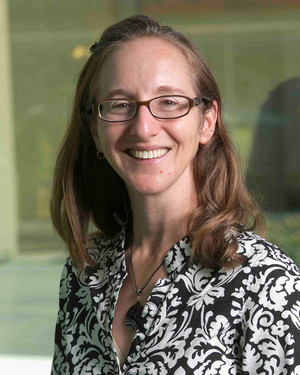
By Andrew Cohen
For Rebecca Golbert, staying calm during a “dream” job interview was easier than one might expect. “The position seemed a little too good to be true, so I never really let myself get too revved up,” said the new executive director of the Berkeley Institute for Jewish Law and Israeli Law, Economy and Society.
Golbert is now overseeing institute programming for the upcoming school year with Professor and Faculty Director Kenneth A. Bamberger. Her hire is supported by a generous grant from the Jim Joseph Foundation. Golbert arrives from Pepperdine University, having worked there as a visiting assistant professor and associate director of its Glazer Institute for Jewish Studies.
“My family had been in the same area for 10 years and we were quite happy,” Golbert said. “But this position was too good to pass up. Living in Berkeley and working at Cal, that’s very exciting. But the institute itself offers a wonderfully unique opportunity. It has created important programming and serious momentum in just two years, and its potential is enormous.”
Launched in 2011, the institute is an interdisciplinary initiative designed to expand Jewish and Israel studies offerings at UC Berkeley. Its two programs—one focused on Jewish law, thought and identity; the other on the study of Israel—serve undergraduates, graduate students, and faculty by strengthening academic inquiry and discourse across campus.
“It’s a terrific opportunity to be part of the transition phase of the institute from a startup initiative to a more permanent part of the university community,” Golbert said. “In addition to offering new courses, programs and renowned speakers, the institute will expand, intersect, and build on academic strengths that already exist here.”
Ample experience
Golbert received her doctorate in social anthropology from the University of Oxford under the supervision of Jonathan Webber, a leading anthropologist of modern Jewry. Her scholarly work reflects overlapping interests in Jewish and Holocaust studies, anthropology and ethnography, and conflict resolution and mediation. She also earned a Master’s Degree in Dispute Resolution from Pepperdine School of Law, and has worked extensively in interfaith dialogue, facilitating conversations among students, clergy, and lay leaders.
At Pepperdine, Golbert was hired to teach and help develop a curriculum in Jewish Studies. At the Glazer Institute, she focused on student support and academic initiatives, developing courses for undergraduates; organizing art exhibitions, panels, and lecture series; and working with other faculty and university units on campus-wide programming.
“We’re both fortunate and greatly pleased to have recruited to Rebecca to Berkeley,” Bamberger said. “This will expand our capacity in several important ways.”
Golbert will oversee the activities of the institute’s two main programs, as well as its broader efforts to support students and faculty. She will also work closely with Miri Lavi-Neeman, who will soon join the institute as Director of Israel Studies Research.
Lavi-Neeman, an Israeli native, is completing her doctorate in geography at UC Berkeley with a focus on environmentalism in Israel. Previously, she worked at the Heschel Center for Environmental Learning and Leadership in Israel and served as founding editor of Hakadur Beyadenu, the Israeli journal of social-environmental education. Lavi-Neeman will teach undergraduates, coordinate colloquia and research conferences, and promote collaboration between UC Berkeley and Israeli scholars.
Some of the institute’s marquee events in 2013-14 will include the annual Robbins Collection Lecture on Jewish Law and Thought by renowned political theorist Michael Walzer; a talk by Haifa Law Professor Fania Oz-Salzberger on Jews and Words, the new book she penned with her father, author Amoz Oz; and an international conference on Israel and the environment.
“The institute’s two programs are engaged in trailblazing endeavors,” Golbert said. “Our Program on Jewish Law has woven new comparative forms of inquiry into the law school’s curriculum—and brought contemporary legal analysis into Jewish studies on campus. Our Israel studies program engages diverse disciplines across the university and builds on its strengths in the environment, technology, and social sciences. The institute offers an unusual emphasis in what is a new area of study, and its contribution to these fields is a uniquely Berkeley project.”